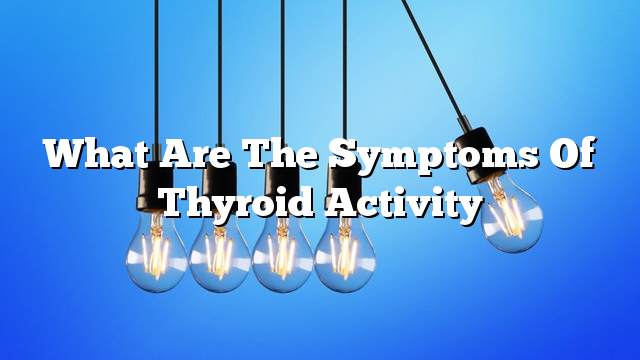Thyroid
The thyroid gland is located in the neck in the form of a butterfly. It is composed of two vesicles lining the trachea and connected to a bridge of the gland tissue. Its inner walls are lined with cells that secrete special hormones, thyroxine (T4) and triiodothyronine (T3). The endocrine system in the body (which does not have special channels in which the secretion of hormones, but directly into the blood).
Thyroid hormones control body growth and metabolism through which the body is energized to work, regulates body temperature, and also plays an important role in brain growth in early childhood. These hormones also affect the heart, muscles, bones and cholesterol. The thyroid gland also plays a role in maintaining the balance of calcium in the blood through the secretion of calcitonin, and may increase thyroid secretions above the normal level, which is called hyperthyroidism or hyperthyroidism, while on the other hand when decreasing the proportion of hormones secreted, In the thyroid.
Studies have shown that women are more likely to develop hyperthyroidism than men twice or 10 times, and that it is more common in people over 60 years of age. And white people and Asians are less likely to have hyperthyroidism.
Symptoms and signs of hyperthyroidism
Thyroid hyperthyroidism is accompanied by several symptoms and signs and does not require its meeting in one case, including:
- Increase appetite to eat with weight loss At the same time, the patient does not store any fat or gain any weight gain, but on the contrary may suffer a continuous loss of weight.
- Apparent hair loss.
- Feeling tired, debilitating and tired even if you do not make any effort.
- Hypoglycaemia.
- Feeling nauseous and wanting to vomit.
- Increase activity and movement.
- Feeling thirsty.
- Feeling irregular in the heartbeat.
- Feeling nervous, tense and unstable.
- Feeling of high temperature quickly, and not tolerating normal temperatures.
- Frequent urination and diarrhea.
- The size of the gland is enlarged, and it is observed by the naked eye.
- Feeling delirious and lack of concentration.
- Loss of libido.
- Trembling and involuntary movements in the parties.
- Increased sweating.
Complications of hyperthyroidism
Hyperthyroidism, if not properly treated, can lead to multiple complications, including:
- Thyroid eye disease: occurs in people with Graves disease, and suffer from the emergence of the eyes and redness and sensitivity to light in addition to the occurrence of deficiencies and double vision.
- Heart problems including: increased heartbeat, atrial fibrillation, and heart failure.
- Osteoporosis is caused by imbalances in calcium and other minerals.
- In rare cases, a person may experience a severe thyroid storm caused by an excessive increase in thyroid hormones. These symptoms include high body temperature, high blood pressure, and abnormalities at the nervous and digestive system, which can result in heart failure.
Causes of hyperthyroidism
There are many reasons for hypothyroidism, including:
- Graves’ disease: The immune system attacks the thyroid gland to increase its secretion.
- Thyroid infection: whether due to a virus or a defect in the body’s immune system.
- Thyroid swelling: This swelling is either a benign toxic tumor in the thyroid, or hyperthyroidism.
- Take large doses of thyroid tablets.
- Postpartum hyperthyroidism.
Diagnosis of hypothyroidism
Hyperthyroidism is diagnosed by:
- Symptoms or clinical examination: The doctor examines the hands of the patient to detect any defibrillation or any rise in temperature, as well as check the changes that appear on the eye if any, and also check the thyroid to observe any changes.
- Blood test to measure levels of thyroid hormones.
- Conduct the radioactive iodine absorption test.
- It is possible to do an ultrasound or a nuclear thyroid.
Methods of treatment of hyperthyroidism
Thyroid response is good for different treatment methods In this case, patients feel a marked improvement in symptoms. There are three main ways of treatment:
- Thionamides: A group of drugs (including carbimazole and methimazole) that reduce the secretion of thyroid hormones.
- The use of radioactive iodine: causes shrinkage of the thyroid gland, thus reducing its activity.
